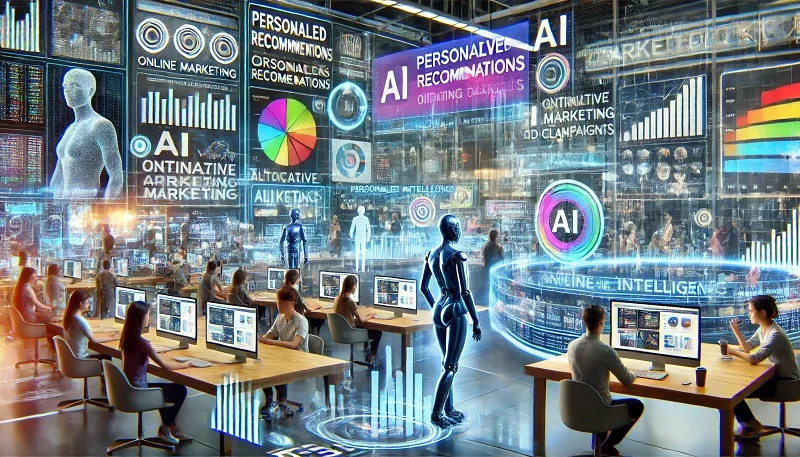
The Impact of Artificial Intelligence on Online Marketing
Artificial intelligence (AI) has become an integral part of modern online marketing strategies, offering businesses unprecedented opportunities to enhance their reach and engagement with customers. This article explores the profound impact of AI on various aspects of online marketing, highlighting key areas where AI is driving innovation and efficiency.
Personalisation and Customer Experience
One of the most significant contributions of AI to online marketing is its ability to personalise customer experiences. AI algorithms analyse vast amounts of data to understand individual customer preferences and behaviours. This enables businesses to deliver tailored content, product recommendations, and personalised marketing messages.
For instance, AI-driven recommendation systems, like those used by Amazon and Netflix, suggest products or content based on a user’s past interactions. This level of personalisation not only enhances customer satisfaction but also increases conversion rates and customer loyalty. Additionally, AI-powered chatbots provide real-time customer support, ensuring a seamless and personalised experience throughout the customer journey.
Data-Driven Decision Making
AI facilitates data-driven decision-making in online marketing by analysing large datasets to identify trends, patterns, and insights. Marketing teams can leverage AI tools to gain a deeper understanding of market dynamics, customer preferences, and campaign performance. This data-driven approach enables marketers to make informed decisions and optimise their strategies for better results.
For example, AI-powered analytics platforms can predict customer behaviour, allowing businesses to anticipate demand and adjust their marketing tactics accordingly. Furthermore, AI helps in segmenting audiences more effectively, ensuring that marketing efforts are targeted at the right groups, thereby maximising ROI.
Automation and Efficiency
AI has revolutionised the way marketing tasks are performed, significantly enhancing efficiency through automation. Routine and repetitive tasks, such as email marketing, social media posting, and ad management, can be automated using AI tools. This allows marketing teams to focus on more strategic and creative aspects of their work.
Automated email marketing platforms, for instance, can send personalised emails to customers based on their behaviour and preferences. Similarly, AI-driven social media management tools can schedule posts, analyse engagement, and optimise content for better reach. This automation not only saves time but also ensures consistency and precision in marketing efforts.
Moreover, AI-powered ad platforms like Google Ads and Facebook Ads use machine learning algorithms to optimise ad placements, targeting, and bidding strategies. This results in more effective ad campaigns with higher click-through rates and conversions.
Predictive Analytics
Predictive analytics is another area where AI is making a significant impact on online marketing. By analysing historical data, AI models can predict future trends and customer behaviour. This foresight enables businesses to proactively adjust their marketing strategies and stay ahead of the competition.
For instance, predictive analytics can help businesses forecast sales, identify potential leads, and determine the best time to launch marketing campaigns. Additionally, AI can predict customer churn, allowing businesses to implement retention strategies to keep valuable customers engaged.
By leveraging predictive analytics, marketers can make data-backed decisions that enhance their marketing efforts and drive business growth.

Enhanced Content Creation
AI is also transforming the way content is created and distributed in online marketing. AI-powered tools can generate content ideas, create written content, and even design visuals. This not only speeds up the content creation process but also ensures that the content is relevant and engaging for the target audience.
Natural Language Processing (NLP) algorithms can analyse vast amounts of text to identify trending topics and generate content ideas. AI writing assistants, such as GPT-4, can produce high-quality articles, blog posts, and social media content. Moreover, AI-powered design tools can create visually appealing graphics and videos tailored to specific marketing needs.
This AI-driven content creation ensures that businesses can consistently produce high-quality content that resonates with their audience, ultimately enhancing their brand presence and engagement.
Improved ROI and Performance Measurement
AI provides advanced tools for measuring the performance of marketing campaigns and calculating ROI. By analysing data from various marketing channels, AI can determine theeffectiveness of different strategies and suggest improvements.
AI-driven analytics platforms offer real-time insights into campaign performance, allowing marketers to adjust their tactics on the fly. This continuous optimisation ensures that marketing budgets are spent efficiently and that campaigns deliver maximum impact.
Furthermore, AI can integrate data from multiple sources to provide a holistic view of marketing performance. This enables businesses to understand the customer journey comprehensively and identify areas for improvement. As a result, AI helps businesses achieve better ROI and drive more successful marketing campaigns.
